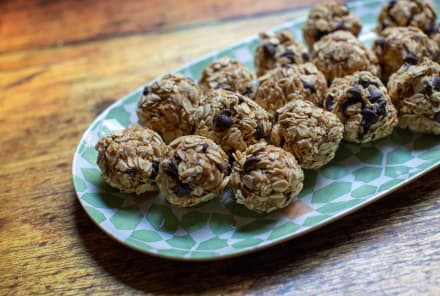Advertisement
What's The Healthiest Way To Brew Coffee? We Asked The Experts


Coffee is the most popular beverage in the world, with more than 400 million cups consumed annually, so it stands to reason that it comes in a wide variety of forms. Cold brew, pour over, French press, espresso—they all produce slightly different results, but does that extend to the health benefits? Is there a healthiest way to brew coffee? We investigated.
Let's start at the beginning—who should actually be drinking coffee?
While coffee has a number of proven health benefits, they don't exist for everybody. Whether you should be reaching for a glass of brewed bean juice at all comes down to your genetics. mbg Collective member and Ketotarian author Will Cole, D.C., explains: "Everyone has two variants of the caffeine gene1—CYP1A2, which controls the enzyme of the same name, and CYP1A2, which determines how well you metabolize caffeine. Either you are a fast metabolizer, which means you tolerate it well and caffeine leaves your system quickly, or a slow metabolizer, meaning your body holds on to caffeine longer making its effects stronger and last longer." According to Cole, people with two fast variants can chug coffee with little to no negative effect, freeing them up to reap the rest of the health benefits. "But if you have one slow and one fast variant or two slow variants, you are more likely to experience the wakening effects of caffeine—or unfortunately, jitters." While available tests can tell you your genetic makeup, you can also go based on how you feel. If coffee makes you feel less than well (or anxious at all), it might not be the best choice for your body. If coffee makes you feel great—well, then let's move on to the healthiest way to brew it.
What's the healthiest way to brew coffee?
There are two main factors to consider when brewing your coffee—the potential toxicity of the container material, and the brewing method's effect on the bean itself.
When it comes to the former, experts recommend a French press or pour-over method since you can easily find vessels made completely of glass or stainless steel, an impossible task in the other forms of coffee creation. These methods also allow the most benefits regarding the latter: "The stainless-steel mesh filter on a French press and the basic open pour-over method allows the coffee's natural oils to pass, which not only improves flavor but also preserves cancer-fighting polyphenols," explains bestselling author Dave Asprey, who revolutionized the coffee world with his invention of Bulletproof lattes, which are spiked with fat for even more health benefits. There are other drawbacks of non-pour-over or French press methods as well. "Your beloved coffee pods and single-brew machines have the potential to be the least healthy for your body because of the pod packaging and the potential for mold growth in the machine, unless they are getting cleaned regularly and properly," says Cole.
Here's where things get complicated: Those oils are called diterpenes. They've gotten press recently for being shown to raise both LDL and overall cholesterol2, but preliminary studies also show that they may be responsible for many of the health benefits of coffee3, including its cancer-fighting abilities.
Both coffee pods and standard drip brews contain filtration that reduces the levels of diterpenes. Instant coffee contains almost no diterpenes, as they've been filtered out during processing. As for the trendy cold brew coffee? "Cold brew retains more diterpenes because there are no paper filters involved," says Vincent Pedre, M.D., mbg Collective member, gut health expert, and author of Happy Gut. "It also has lower acidity, which makes it easier on the stomach."
Different brew methods also result in different amounts of caffeine. Says Pedre, "Drip brew contains the most caffeine of any method—the longer the brew cycle, the more caffeine is released." French press is also relatively high in caffeine, while cold brew also tends to contain less caffeine (although a longer steeping time can result in more).
"Note that some coffee shops will brew stronger cups than others. If you're not sure, consider an espresso or Americano—you'll get about 75 mg caffeine per shot versus the 100-plus in 8 ounces of drip coffee," says Jess Cording, R.D., mbg Collective member and founder of Jessica Cording Nutrition.
While caffeine isn't inherently good or bad, how it affects your body goes back to your genetic makeup. People with one or two slow variants may want to stick to brew methods that are lower in caffeine for a better net impact on their body.
With all of that information, what's your best bet? Most experts recommend a pour-over method (this is a great, affordable vessel option), with an unbleached filter to avoid extra chemical exposure. You eliminate most—but not all—of the diterpenes while retaining as many polyphenols as possible. If you don't have cholesterol issues, mixing in a glass of Turkish, cold brew, or French press coffee on occasion for even more diterpenes might not be a bad idea; although if you suffer from any cardiovascular problems, that should likely be avoided.
Of course, the beans matter, too.
"A lot of mass-market coffee brands have mycotoxins in their coffee grinds, which can have a negative effect on your health," says Asprey, who founded his Bulletproof brand to eliminate mold and toxicity problems.
Pedre notes that "darker roasts contain less caffeine since the caffeine is typically cooked out of the bean during the roasting process." Cording always recommends that her clients look for organic beans whenever possible, especially if they're consuming coffee daily. "It's one of the best ways to help reduce your exposure to pesticides."
Watch Next
Enjoy some of our favorite clips from classes
Enjoy some of our favorite clips from classes
What Is Meditation?
Mindfulness/Spirituality | Light Watkins
Box Breathing
Mindfulness/Spirituality | Gwen Dittmar
What Breathwork Can Address
Mindfulness/Spirituality | Gwen Dittmar
The 8 Limbs of Yoga - What is Asana?
Yoga | Caley Alyssa
Two Standing Postures to Open Up Tight Hips
Yoga | Caley Alyssa
How Plants Can Optimize Athletic Performance
Nutrition | Rich Roll
What to Eat Before a Workout
Nutrition | Rich Roll
How Ayurveda Helps Us Navigate Modern Life
Nutrition | Sahara Rose
Messages About Love & Relationships
Love & Relationships | Esther Perel
Love Languages
Love & Relationships | Esther Perel
What Is Meditation?
Box Breathing
What Breathwork Can Address
The 8 Limbs of Yoga - What is Asana?
Two Standing Postures to Open Up Tight Hips
How Plants Can Optimize Athletic Performance
What to Eat Before a Workout
How Ayurveda Helps Us Navigate Modern Life
Messages About Love & Relationships
Love Languages
Advertisement

These Peanut Butter Cup Protein Bites Make The Perfect On-The-Go Snack
Molly Knudsen, M.S., RDN

Your Grandma's Go-To Supplement Is Once Again Popular (For A Good Reason)
Molly Knudsen, M.S., RDN

These Peanut Butter Cup Protein Bites Make The Perfect On-The-Go Snack
Molly Knudsen, M.S., RDN

Your Grandma's Go-To Supplement Is Once Again Popular (For A Good Reason)
Molly Knudsen, M.S., RDN








